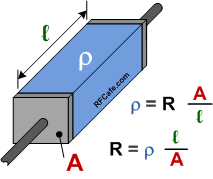For a project, I'm trying to create a water concentration sensor which measures PPM of a water sample. In order to calculate PPM, I need to find the electrical conductivity of the water, which involves finding its resistivity. Currently, I'm able to measure the resistance of the water. How can I calculate its resistivity? I assume I need some information about the volume of water as well as the resistance but I can't find any formulas that seem useful.
-
1$\begingroup$ You can find it in Wikipedia "Electrical resistivity and conductivity" $\endgroup$– Thomas FritschCommented Jan 13, 2022 at 16:52
-
$\begingroup$ Water is known as the universal solvent because it dissolves more chemical species than any other solvent. Do you know how the water conductivity in your sample will be affected by the solvent that it is dispersed through? $\endgroup$– David WhiteCommented Jan 13, 2022 at 17:31
1 Answer
Resistance is given by the following formula:
Resistance = Resistivity X length / area
Thus, Resistivity can be calculated as:
Resistivity = Resistance X area / length
You will need a setup where cross-section area and length are known to you. For example a setup like this:
Consider a pipe (shown as rectangular in the image above but could be a cylinder) with metal plates in the end and the space between the plates filled with water.
You can use a multimeter to measure the resistance by keeping the probes on the end metal plates. The length and cross-section area is known. Just plug in the values to get the resistivity.

